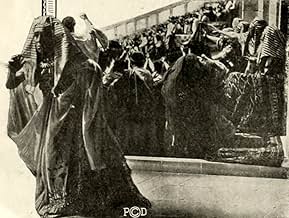- Directors
- Writers
- All cast & crew
- Production, box office & more at IMDbPro
Featured reviews
A young blind woman and her general misery provide the focus for this 1913 silent film. Her story is set against everyday life in Pompeii, just before the eruption of the famous volcano.
Visually, the film consists of staged sets, rather like modern stage plays. There is no camera movement. Actors mouth words we can't hear. The only sound is the music of a piano, provided on behalf of DVD viewers. The music varies in tone with tonal variations in the story. Alternating with the play and to assist the visuals, title cards convey a verbal sense of what will happen in the next scene.
Acting is very, very theatrical. When they move, the players don't walk, so much as they tiptoe across the stage, in a self-conscious and stagy manner. When there's conflict, the players overact, exaggerating both body movements and facial expressions. But that was how it was done back then. Costumes are elaborate, and at times ornate.
Vesuvius erupts in the final few minutes of the film. Lots of smoke, some soot, a change in the film's tint to reddish, falling pillars, and predictable histrionics of the players comprise the special effects.
Even aside from the simplicity of the special effects and the absence of sound, the film is not likely to appeal to modern audiences, if their purpose in watching films is to be entertained. For one thing, the film's pacing is very slow. Also, there's lots of filler material, like scenes wherein characters sit around feeding pigeons. And I found it hard to identify with any of the characters. They seem too thinly drawn and remote.
In its time, "The Last Days Of Pompeii" must have seemed like a grand spectacle. We are fortunate to have the film now, as a benchmark from which to compare contemporary films. Ergo, for those interested in the history of the cinema, and for those who want some perspective on modern film-making, this film is a fine choice.
Visually, the film consists of staged sets, rather like modern stage plays. There is no camera movement. Actors mouth words we can't hear. The only sound is the music of a piano, provided on behalf of DVD viewers. The music varies in tone with tonal variations in the story. Alternating with the play and to assist the visuals, title cards convey a verbal sense of what will happen in the next scene.
Acting is very, very theatrical. When they move, the players don't walk, so much as they tiptoe across the stage, in a self-conscious and stagy manner. When there's conflict, the players overact, exaggerating both body movements and facial expressions. But that was how it was done back then. Costumes are elaborate, and at times ornate.
Vesuvius erupts in the final few minutes of the film. Lots of smoke, some soot, a change in the film's tint to reddish, falling pillars, and predictable histrionics of the players comprise the special effects.
Even aside from the simplicity of the special effects and the absence of sound, the film is not likely to appeal to modern audiences, if their purpose in watching films is to be entertained. For one thing, the film's pacing is very slow. Also, there's lots of filler material, like scenes wherein characters sit around feeding pigeons. And I found it hard to identify with any of the characters. They seem too thinly drawn and remote.
In its time, "The Last Days Of Pompeii" must have seemed like a grand spectacle. We are fortunate to have the film now, as a benchmark from which to compare contemporary films. Ergo, for those interested in the history of the cinema, and for those who want some perspective on modern film-making, this film is a fine choice.
The romance of Glaucus and Ione (called Jone here) plus the hopeless love of blind Nidia, intertwine with the nefarious machinations of an Egyptian priest, to make up most of the story. For its time, this was a new departure in cinema, but today it will strike most viewers as too tame. There is no camera movement. Title cards carry little or no dialog. And most evidently the cast was not chosen for physical attractiveness, men or women. Still the story gets told, and rather catches one up, especially the portion of the plot involving blind Nidia. The special effects depicting the eruption of Vesuvius are not bad for 1913, but don't expect anything like the documentaries of the eruption of Hawaiian volcanoes!
This silent Italian melodrama may be a challenge for modern viewers, but it's a "must" for real fans of the silent era. Along with other early Italian epics now available in great DVD editions, such as "Cabiria" from 1914, these movies remind Americans that before World War I, European filmmakers were creative pioneers who stretched the medium and the imaginations of American directors. This film version of the "Pompeii" story was shot with static cameras and looks a bit like a broadly acted stage production transfered to film. But the production is elaborate, featuring stage sets as well as some location shooting. Just watching the images unfold in this twisted tale of love and jealousy on the eve of the disastrous eruption of Mt. Vesuvius can be fascinating as we peer back across the century at this 1913 release. To current sensibilities, the film does reflect some prejudices of its era, including the casting of an Egyptian priest as the mysterious, evil force in Pompeii -- an early example of a century-long demonization of Arab figures in movies. However, for viewers exploring early cinema, who are familiar mainly with slapstick comedies and D.W. Griffith, watching a pre-WWI Italian epic like this can be a fascinating experience.
An evil Egyptian priest menaces a young Roman maiden while a blind slave girl shows great courage in attempting to rescue her beloved master, during THE LAST DAYS OF POMPEII.
Produced less than two decades after the birth of cinema, this silent film is considered to be the first important historical epic filmed on a truly grand scale. It also heralded the arrival of the Italian movie industry as a force to be reckoned with, however briefly, in the halcyon days before World War One.
Produced by prolific director Mario Caserini (1874-1920), it features a completely static camera which has the effect of turning each shot into a living tableau. (The only exceptions are a few pan shots of flowing lava which were inserted in the film's final moments.) Caserini manages his early crowd scenes very nicely, in which everyone looks like they're actually doing something and have a reason to be in the shot. The use of light & shadow on the large sets is also most commendable.
The final twenty minutes, when Vesuvius blows her top and destroys Pompeii, features special effects which are still quite impressive. After more than an hour of silver toned film, the abrupt switch to red tints at the instant of the eruption is a definite attention grabber.
Much of the acting is very theatrical & overripe, but that was the style back then and was probably much affected by grand opera. Two performers should be noted - Fernanda Negri Pouget is quite touching as the tragic blind girl, and Ubaldo Stefani, as the hero, is unintentionally hilarious in the scene in which he drinks a witch's poisoned brew.
The film's final moments embrace a mature sensitivity and highlight the latent power of the cinematic image.
Produced less than two decades after the birth of cinema, this silent film is considered to be the first important historical epic filmed on a truly grand scale. It also heralded the arrival of the Italian movie industry as a force to be reckoned with, however briefly, in the halcyon days before World War One.
Produced by prolific director Mario Caserini (1874-1920), it features a completely static camera which has the effect of turning each shot into a living tableau. (The only exceptions are a few pan shots of flowing lava which were inserted in the film's final moments.) Caserini manages his early crowd scenes very nicely, in which everyone looks like they're actually doing something and have a reason to be in the shot. The use of light & shadow on the large sets is also most commendable.
The final twenty minutes, when Vesuvius blows her top and destroys Pompeii, features special effects which are still quite impressive. After more than an hour of silver toned film, the abrupt switch to red tints at the instant of the eruption is a definite attention grabber.
Much of the acting is very theatrical & overripe, but that was the style back then and was probably much affected by grand opera. Two performers should be noted - Fernanda Negri Pouget is quite touching as the tragic blind girl, and Ubaldo Stefani, as the hero, is unintentionally hilarious in the scene in which he drinks a witch's poisoned brew.
The film's final moments embrace a mature sensitivity and highlight the latent power of the cinematic image.
This amazing Italian silent epic, featuring a cast of millions, will blow your mind as thoroughly as Mt. Vesuvius blew up Pompeii. Breathtaking special effects, an excitingly melodramatic plot, stunning settings, and gorgeous cinematography combine to make this one of the first great feature films.
The cinematography is very different to what we are used to today - the camera does not move at all - but the shots are so well lit that it hardly seems to matter. And the genuine beauty of the final shot makes the scene very moving indeed.
This is an unmissable masterpiece of cinema.
The cinematography is very different to what we are used to today - the camera does not move at all - but the shots are so well lit that it hardly seems to matter. And the genuine beauty of the final shot makes the scene very moving indeed.
This is an unmissable masterpiece of cinema.
Did you know
- TriviaFor a while in the late summer and fall of 1913 there were two major Italian productions on this subject playing simultaneously in the US, this one produced by Ambrosio, and The Last Days of Pompeii (1913), produced by Pasquali.
- GoofsExtras are "killed" by falling pieces of a set during the explosion scene, then appear to either get back up or adjust themselves so that they won't be trampled by other extras.
- Alternate versionsKino International Corp. copyrighted a version in 2000 with a piano music score compiled and arranged by Beatrice Jona Affron and performed by Martha Koeneman. It was produced for video by Bret Wood and runs 88 minutes.
- ConnectionsFeatured in Cinema Europe: The Other Hollywood: Where It All Began (1995)
- SoundtracksGiselle
Written by Adolphe Adam (as Adam)
Arranged by Beatrice Jona Affron
Performed by Martha Koeneman
Excerpts in the 2000 alternate version score
Details
- Release date
- Country of origin
- Languages
- Also known as
- Pompejis sista dagar
- Production company
- See more company credits at IMDbPro
- Runtime
- 1h 28m(88 min)
- Color
- Sound mix
- Aspect ratio
- 1.33 : 1
Contribute to this page
Suggest an edit or add missing content
























